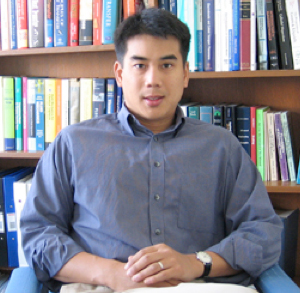Dr. Leslie Y. Yeo
The PhysOrg article Einstein’s Tea Leaves Inspire New Blood Separation Technique said
“Scientists at Monash University in Australia have developed a process for rapidly and efficiently separating blood plasma at the microscopic level without any moving parts, potentially allowing doctors to do blood tests without sending samples to a laboratory.The new method uses the same principle that causes tea leaves to accumulate at the center of the bottom in a stirred teacup, a phenomenon first explained by Einstein in the 1920s.
The research was done by Drs. Dian R. Arifin, Leslie Y. Yeo, and James R. Friend, of the Monash University’s Micro/Nanophysics Research Laboratory. Their findings were published in the current issue of the new open-access journal Biomicrofluidics.”
Leslie Y. Yeo, Ph.D. is Australian Research Fellow and Senior Lecturer in the Department of Mechanical & Aerospace Engineering at Monash University, Australia. Together with Associate Professor James Friend, he established the Micro/Nanophysics Research Laboratory shortly after joining the department as a Lecturer in 2005.
This follows a postdoctoral stint with Professor Hsueh-Chia Chang at the Center for Microfluidics and Medical Diagnostics, University of Notre Dame in 2003/4 and industrial experience as a Mathematical Modeller at Det Norske Veritas in 2002/3. He had previously completed his MEng and Ph.D. degrees in Chemical Engineering at Imperial College London in 1998 and 2002, respectively.
His Ph.D. thesis, with Professor Omar Matar, involved the theoretical investigation of Marangoni (surface tension gradient) driven drop coalescence dynamics and how it relates to phase inversion of liquid-liquid dispersions. For his work, he was awarded the Dudley Newitt prize for a theoretical/computational thesis of outstanding merit. His Ph.D. studies were supported through two awards, namely the Overseas Research Scholarship and the University of London Knight Studentship in Science & Engineering.
Leslie is the recipient of the 2007 Young Tall Poppy Science Award and the 2009 Vice-Chancellor’s Award for Excellence in Early Career Research. He currently serves as the Co-Editor of the American Institute of Physics journal Biomicrofluidics. His current research interests are in acoustically and electrokinetically driven microfluidics for engineering and biological applications.
Leslie coauthored Electrokinetically-Driven Microfluidics and Nanofluidics. His papers include Interfacial Jetting Phenomena Induced by Focused Surface Vibrations, Miniature Inhalation Therapy Platform Using Surface Acoustic Wave Microfluidic Atomization, Electrokinetic Actuation of Low Conductivity Dielectric Liquids, Drop Manipulation and Surgery Using Electric Fields, Electric Tempest in a Teacup — The Tea Leaf Analogy to Microfluidic Blood Plasma Separation, Marangoni Instability of a Thin Liquid Film Resting on a Locally Heated Horizontal Wall, and Piezoelectric Ultrasonic Micro/Milli-scale Actuators. Read the full list of his publications!
His patents include A Scaffold Seeding Method, Apparatus and Method for Non-Contact Microfluidic Sample Manipulation, Concentration and Dispersion of Small Particles in Small Fluid Volumes Using Acousting Energy, Microfluidic Systems Using Surface Acoustic Energy and Method of Use Thereof, Process and Apparatus for Generating Particles, and Apparatus and Method for Non-Contact Microfluidic Sample Manipulation. Read the full list of his patents!
Read Earthquake on a wafer could boost asthma relief and Pizza tossing art unlocks secrets of tiny motors. Read his LinkedIn profile.
